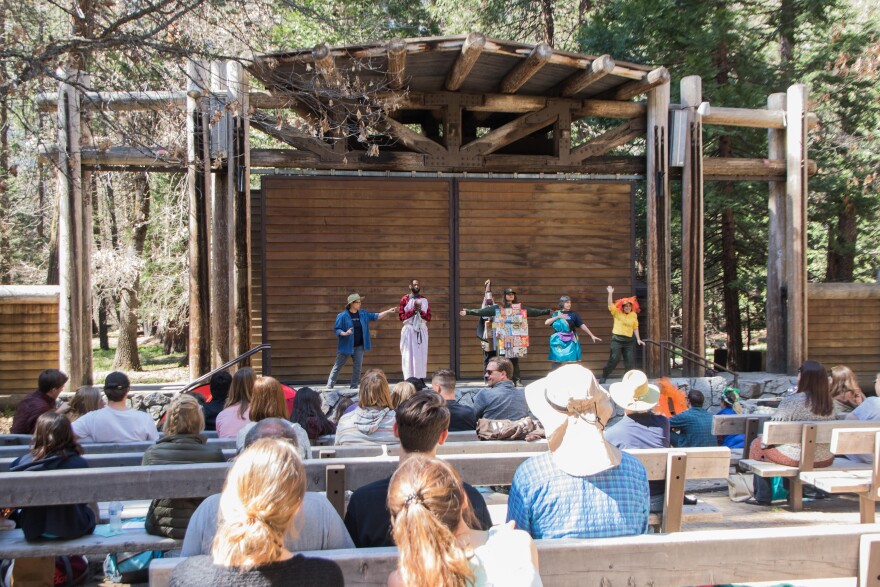This past Sunday, April 22, was Earth Day. But did you know that the day before was the birthday of conservationist John Muir, or that the day after was the day widely believed to have been the birth and death of William Shakespeare? These may seem like unrelated occasions, but one special event brought all three together in Yosemite National Park.
Majestic. Peaceful. Calming. For many, these are the words conjured by Yosemite National Park. But in the park this past weekend, hundreds of visitors may have borne witness to a most rare vision: Two deaths, a wedding, and a fairy falling in love with a donkey.

It was William Shakespeare’s "A Midsummer Night’s Dream," performed in the shadows of pine trees and towering granite walls. It was the brainchild of two directors, both English professors and Shakespeare scholars: Katie Brokaw of UC Merced and Paul Prescott of the University of Warwick in England.
“This whole story began with a walk in the park about 2 years ago,” Prescott said. “We were just stumbling around the valley where we are now and we came across this beautiful little amphitheater.”
“We had the thought at the same time,” Brokaw said: “Wouldn't it be great to stage Shakespeare right here in this cute little theater in the middle of the valley?”
Choosing "A Midsummer Night’s Dream," they said, was a no-brainer.
“It certainly is about the natural world,” Brokaw said. “It’s about people going into nature and being transformed and coming back different.”
“So in a way, what the play does is it mimics the experience that everyone has who goes out into a national park,” Prescott said.

Shakespeare aficionados would recognize the main characters: The mischievous sprite Puck; Fairy King Oberon and Queen Titania; and the hapless humans ensnared in a web of mismatched love. But they’ve never before seen this adaptation, which takes place 400 years after the original. Fairies ride skateboards, complain about spotty cell phone coverage, and sing The Beatles.
But environment in this adaptation is even more important than the time period. Instead of Athens, lovers get lost in Yosemite. Their costumes are made from trash collected in the park. And some of Shakespeare’s language has been replaced by words used by Southern Sierra Miwok Indians.
The cast was made up of students, professional actors, and a park ranger. Renowned Los Angeles-based Shakespearian actress Lisa Wolpe has starred in seven adaptations of this play—but never before as Puck, who utters those immortal words: “Lord, what fools these mortals be.”
“I’ve been waiting my entire life to say that,” Wolpe giggled.

Devon Glover, who played two characters, had never been to Yosemite before. Known as “The Sonnet Man,” he rewrites Shakespeare’s poetry into hip hop—which he did with many of his lines.
“It’s just another way of introducing Shakespeare, saying hey, Shakespeare’s cool, Shakespeare’s relevant,” he said. “We’re still reading it, so just embrace it and have fun with it.”
Dwayne Newbold, a UC Merced music major who played Lysander, said it was easy to feel overshadowed by the park itself.
“There’s a part in the play where we have to look around and be wowed by the wood, and I never realized how far we’d have to be lifting our heads up to look at the top of all these mountains and everything,” he laughed. “So, a little bit upstaged, but it’s granted.”
Organizers estimate the weekend’s five free performances drew close to 1,000 spectators. And they seemed enchanted—especially when Puck heckled them. One family said they’d be back for a second show.

Sixteen-year-old Jade Jacobs loved the way the characters pointed out the animals and plants native to the area—like pine cones and Mariposa lilies.
“I thought it was kind of a trip to just have them reference things and you could look around and be like ‘that’s that, they just referenced that thing,’” she said.
It was hard to separate theater from nature. Pine needles rained down on the audience. In at least one show, a bobcat padded by.
Director Paul Prescott said that was kind of the point. “We hope we're telling a really fun and accessible but also profound story about the human relationship with the environment,” he said—something maybe John Muir and William Shakespeare could have appreciated.





